#and the people at the top of those hierarchies have to be a certain way
Explore tagged Tumblr posts
Text
my new favourite thing is watching the entire the devil wears prada movie, except all the part after miranda says the sees a lot of herself in andy and andy says that's not true and ends her career.
you know. that's not very uplifting for young people. but 2006, right? what's a career to a woman. (/s) the 2020s might be full of bullshit but i'd rather be living now, barring climate armageddon, than in any decade before. i'd visit the victorian era, sure, but live? no way.
#i have a lot of big ideas#these days#and i think miranda is kind of the queen of her own feud#so to speak#ever since humans have formed societies there have been hierarchies#and the people at the top of those hierarchies have to be a certain way#everyone has a job and a place#that's not to say capitalism is right#it's about how power is concentrated#there is always power but the way that it's given to people might not be right#but unless we find a way to consciously subvert that#i think it's the way of things#miranda is successful because she is the person that she is#and her saying that andrea is like her is actually very very encouraging#if andy wants to be at the top that is#but not everyone wants that or is cut out for it#still idk what the story was about if that's the case#anyways
0 notes
Text
we are incredibly blesseddddd in the harry potter fandom. no matter what era you are reading, there is such a wide array of fics for you to enjoy - such a multitudeeee of long-fics, aus, ships, tropes etc etc. we are so blessed to have this much to engage with.
but with that comes a lot of entitlement i feel. because there's more to "compare", there's more to call "the big fics" or "the best fics" and suddenly we're no longer blessed, because people don't appreciate fandom for what it is - a bunch of losers (affectionate) sitting in their rooms, writing fanfiction about wizards in their spare time, and sharing it with strangers online. rather it starts becoming competitive.
and 99.99% of the time, it's not the people writing these fics that start the comparisons and the competitions, it's those reading it. they'll publicly question why a fic has so many hits, they'll assume that fandom etiquette no longer applies just because a fic is popular, and they'll forget that these are people writing them, not just ao3 pseudonyms. they'll critique writing styles, get hung up on typos or grammatical errors etc etc. they'll start saying which piece of creative writing done by a person in their free time as a hobby is "worth it" and which ones aren't. and it's wild because they're the ones that have put these fics at the top. they're the ones that have decided these fics are the most worthy,,, and then they critique them?
and most of this is because of the hierarchy, absolutely. there's been a mass separation of readers-writers because people refuse to engage, and they start viewing themselves as "customers" receiving a "product" and they complain when it doesn't fit their standards. some of it is also the changing face of fandom spaces as they get big on more traction-based platforms like tiktok. all of it comes down to entitlement.
they start enforcing standards for fanfictions to live up to and start dictating what "good" writing is, as if that doesn't go against the very nature of a fandom space. a space where everybody's voice is heard and everybody has the same opportunity to create things (side tangent: this is not the time to be dictating what voices/experiences/talents deserve to be heard. free and open sources of literature are incredibly important right now. we often talk about the fact we hold fanfiction to the same standard as publit, which yes we do and that is not what we should be doing. but now we're starting to police it the same way publit is, and now is not the time. there is never a time tbh, but now when book bans are running rampant across the world? you want to decide which fics deserve to be read and which ones don't? hm).
and the worst thing is that not only are people critiquing the works we already have, but they demand more.
they'll say there's no more long-fics getting written, and then they won't go and engage with WIPs and encourage authors to continue, they won't start a fic until it's complete and then complain that nothing is complete. they'll say there's not enough fics for a certain ship, and instead of engaging with those producing them or encouraging love and engagement for them with others, they'll go into comment sections and hate on another ship. they'll say there's not enough of a certain trope and then they'll read one and go "hm. not like that" or not enough of a certain character and then go "actually i don't see them like this so this is written awfully".
most of all, they'll say that certain fics or ships have a ruined a fandom, and then they'll post things that go sooooo against what a fandom is, and just add to what is actually ruining wider fandom spaces - entitlement.
you are not entitled to long-fics, these are being written by people in their free time, and you refuse to engage with them as they're being written. you are not entitled to perfect grammar and presentation, fanfiction is for everybody and it is not a profession, it's a hobby. you are not entitled to the characterisations that you deem to be best, everything is malleable and you engage with what you like (better yet, write it yourself if you're so open to shitting on others. you do it then). you are not entitled to regular and consistent updates, you do not get a monopoly over this person's time. and you're going to see a lot less works over time if this is the way you treat them.
you are not entitled to any content in a fandom space, and no one is required to provide it for you. and most of all, your opinions and your characterisations and things you enjoy are not more worthy than anyone elses' - reading is subjective, we learnt this in primary school.
fandom is for self-exploration and it is self-curated. it's so self-curated and if you are having such a negative time in fandom because you can't find anything "good" or "worth it"? maybe there's some self-reflection to do as well. maybe you should sit and wonder why you feel entitled to things and why you feel the need to pit authors against each other or critique free works publicly, instead of wondering why other people are reading them.
we are so incredibly blessed to be in a fandom as diverse as this one with such an array of interpretations and such a wide spread of fics to choose from, but let's return to our roots and remember that - despite how many there are - everything is written by a Human Being. in their Free Time. For Fun.
and it's not fun to watch videos calling works bad get thousands of views and likes. you are not owed anything. and it is not okay to say these things just because "they'll never see it" - it says a lotttt about you as a person that there has to be some kind of impact for you to be kind.
it's like,,, would you go to a free bake sale and go "god i fucking hate red velvet!!!" and tell them they're doing a bad job, or would you pick up the chocolate cupcake you like instead and move on with your day whilst acknowledging that someone, not you but someone elseee, might like red velvet??? ykkkk??? you get me????
#also like if they're never gonna see it? what use is your critique besides being an asshole?#out of principle i'm not proofreading this and you'll have to adjust to any typos or inconsistencies#to include my favourite tag:#it was a labour of love for the author whether you shared that love or not#mhm yah#i was up until 6am ranting about a mean video to my friends#and it is now 6pm the next day and i'm still ranting about it#OOPSIEEE#robrauders yap
263 notes
·
View notes
Text
drives me nuts when people treat jin guangyao or wei wuxian like they're socialist revolutionaries like no! they're not!! in fact their respective roles in society and complacency regarding its hierarchies is why ANY of the story even happens to begin with!!!
jin guangyao doesn't hold bitterness just because he was born lower class. he is bitter because others deride him and his prostitute mother in spite of both their intelligence, skills, and efforts to climb the ladder.
why do you think we were shown scenes of other prostitutes in the brothel deriding meng shi for being literate, for "trying" so hard? why do you think we were shown scenes of anxin taunting meng yao and throwing shit at him because he was trying to learn cultivation at his mother's behest?
why do you think jin guangyao arranged for the arson of that brothel, burned to the ground with everyone except sisi inside? that's not the behavior of someone who believes in true equality and the inherent worth of sex workers as human beings!
that's the behavior of someone who thinks he's better than them. the behavior of a man who already came up on top through political games and war crimes, backstabbing and spying for the sake of the "greater good".
i won't rehash his argument to nie mingjue that he didn't have a choice-- he had some choice, but no matter what he does his class will come up and people will always assume the worst and try to hurt him for it, which forces his hand to do whatever will protect him best (hence 'no choice').
jin guangyao did everything he could to secure his own safety and a place among those already higher up. and by that point, he'd won it.
the fact that the temple rebuilt on the brothel site is to guanyin, the goddess of mercy, is even more ironic! the fact that jin guangyao has the goddess's statue carved to look like his own mother is proof that he viewed both her and himself as higher than them. more worthy than them.
of course he cared about the general welfare of others (read: the watchtowers). but consider also that there is no watchtower near yi city, which ended up being one of xue yang's playgrounds. jin guangyao can and will turn a blind eye to certain sufferings if it is convenient to him.
sure, jin guangyao made undeniable contributions to cultivation society and accessibility, but he is not at any point trying to topple existing class structures. his adherence to them is in fact integral to his own downfall in the end.
it brings with it the inevitability of society conveniently ignoring his triumphs and genuine moments of humanity to deride him once more as an evil, disgusting son of a whore once his crimes come to light.
now for wei wuxian. he's the righteous protagonist of the story and he doesn't give a fuck what society thinks, yes, but he wasn't out there trying to cause an uprising so that all the poor servant classes and lower could become cultivators. he wasn't trying to redistribute wealth or insinuate that those who are lower deserve to be viewed as equal to the gentry.
the most critical and non-explicitly stated fact of mo dao zu shi is that wei wuxian has always been resigned to his position in the social hierarchy.
his unreliable narration, especially regarding his own past and thoughts, is so damn important. he doesn't EVER tell the reader directly that people treated him any which way at their leisure because of his parents' differing social classes.
no. instead we are shown how much prestige he is afforded as cangse-sanren's son-- reputation as a talented and charming young cultivator, made head disciple of Yunmeng Jiang-- and how little respect he is given in the same breath, as the son of servant wei changze.
the way he is treated by others is as fickle as the wind. if he obeys and does as told, there is no reward. of course he did that, that was the expectation to start with! if he does anything even slightly inconvenient, there is a punishment. of course he has no manners, what else would you expect from an ungrateful son of a servant?
wei wuxian's righteousness is not a matter of adhering to principles he was explicitly taught, the way nie mingjue values honor or the way jiang cheng always tries to prove himself. wei wuxian does the right thing regardless of what the consequences are to him because his good deeds are always downplayed and his bad deeds are always singled out, no matter who or how many people were doing it with him.
he has faced this double standard since childhood. there are points in the novel where it's clear that this sticks out to wei wuxian, but does he ever fight back against that view of himself? does he EVER, at any point in the story, explain his actions and choices to jianghu society and try to debate or appeal to their sense of reason?
no. because he knows, at his very core, that any explicit deviation from their interests whatsoever will be punished.
slaughtering thousands of people is fine when they want him to do it, and when the alternative is unjust torture, re-education camps, and encroachment upon other sects' lands.
slaughtering thousands of people who are trying to paint him as evil for not going along with their genocidal plans, however, is punished.
wei wuxian knows his acceptance among the higher classes is superficial and unsteady. from the age of 10, when jiang fengmian took him in, he knew subconsciously that he could be kicked out at any time.
he knows that cultivation society doesn't care about war crimes and concentration camps and mistreatment of the remaining wen survivors of the sunshot campaign. but the right thing to do now that they aren't at wartime is to help them, plus they'd punish him either way for it, so he will.
in this regard wei wuxian is more self-aware of his position than jin guangyao. he does care about common people and he does try his best to help them as an individual. even if that ends up with him disabled, arrested, targeted in sieges, or dead.
but is he revolutionary? in the full equality, fight the establishment, rewrite laws, change social structures and people's perceptions of class sense?
no. no. he isn't.
now my knowledge of chinese society and history is fairly limited to my hindu diaspora upbringing and our shared cultural similarities ... but speaking to what i absolutely know us true, adherence to one's social class is expected.
this is rigid. efforts and merits might bring you some level of mobility, but in the end, the circumstances of your birth will always be scrutinized first, and your behavior compared to the stereotypes of where and how you originate.
mdzs is not about revolution, and none of its characters are able to truly change its society. there is no grand "maybe cutsleeves aren't inherently bad" or "i'm sorry for persecuting you and believing hearsay, you were truly a good person all along!" at the finale.
people ignore history and repeat it again with the next batch of ugly gossip and rumors.
wei wuxian, lan wangji, and luo qingyang find peace only by distancing themselves from cultivation society and its opinions.
jin guangyao and wei wuxian both cannot ever escape from others' perception of their origins and actions. regardless of their personal beliefs, they are not revolutionaries.
#keri chats#mo dao zu shi#long post#mdzs spoilers#wei wuxian#jin guangyao#mdzs meta#the untamed#cql#i know it's funny or fanon to call them commies but it's so deeply fucking important to me that ppl understand they CANONICALLY are NOT#AAAAAAAAAAAAHHHHHHHHHHHHHHHH#this is messy and unedited and rather surface level but again if you read this post i love you lmao#wwx did the right thing in the xuanwu cave by helping mianmian and fighting back against wen chao BUT he was punished for it#through wang lingjiao's visit insisting he be whipped for it + the fall of lotus pier#like if wwx'll be punished either way ofc he'll do the righteous thing. but he is undeniably resigned to the fact that they won't change#wwx doesnt TRY to change THEM. he just does what he wants & believes is right himself#big difference & while jgy is often easy to clear up i still see so many people say that wwx is different and im like. YES but also GOD NO#mdzs#danmei
166 notes
·
View notes
Text
Why Nakshatra Castes Don't Correspond to Levels of Success

Nakshatra Castes, unlike what you might think, are not strictly about money or status or levels of success. They’re about visibility. Nakshatra gaze (upwards, downwards, sideways) is more about interest in status itself, and wealth is something very individual to one’s chart and karma. Life is complex and some people who you might think are really wealthy have hidden debts, while many invisible people are very well off.
To imagine how this works, you need to picture an ancient society, an ancient town structure. They were mostly built on hills for defensive purposes, with castles being on the very top of the hill. Since there was no TV or internet, often what was happening at the top was a source of entertainment for the masses. That is especially visible, as non of the Brahmin Nakshatras are upwards (often born or growing into a certain status). But they are all ones that perform activities in front of the masses. And some of those tendencies have survived in our societies.
The prime example is Purva Phalguni and Purva Ashadha being such huge Nakshatras for creativity. They are still “on display” being watched by the masses, even in our times. Purva Bhadrapada, especially in males, loves to put itself on top for the sake of displaying his wisdom and skill. Think of Robert De Niro, who picks roles where even if his character commits crimes secretly, he has quite a social presence. Purva Bhadrapada loves to be active in the community. And finally, Krittika, the ceremonial master, the ultimate priestly expression. Wild and untamed, but again very much on display.
In ancient towns, these would be the people that are talked about. The people whose identity and role would be common knowledge.
To contrast that scenario, think of Mleccha. You can’t say that they most definitely don’t have money or a certain power. But they perform activities that happen outside the town gates. They are the creatures of the underworld, as their talents are of a controversial nature. Does that mean they can’t have wealth or be popular in their own way? Of course not, especially since Shravana is an upwards Nakshatra. Everyone comes to the local Oracle in times of need, even if they don’t admit to it. But there is a certain quirkiness about them, where even though many people use their services, they don’t openly admit to it.
Think also of the butcher caste, that technically is so low in hierarchy, but has 2 upwards Nakshatras within. That is because these people often have an ancestral profession of doing dirty work that is very needed within society, and thus it brings them renown and success. Dirty work may not be done on display, but it is nevertheless a necessary part of daily life.
The difference between Shudra and Mleccha is that while Shudra is the lowest acceptable class, it still deals with needs that people are not ashamed to talk about openly even if it’s not a pleasurable subject. Mleccha is the things everyone does, needs and wants, but is ashamed to admit, so they repress it or do it in hiding. Attraction to the forbidden aspects of sexuality, the taboo, the occult. People do whatever they need to anyway, simply outside the town borders, outside of the social gaze. As a result, Mleccha natives achieve success as providers of these services.
91 notes
·
View notes
Text
Hidden Agenda Ep 1 Soft D/s Commentary

I was explaining to some friends that I feel Hidden Agenda was a great example of cultural D/s or soft D/s. I'm going to do my best to explain why I see it this way.
Now, first impressions would have you believing that these two are on equal footing. Both have attitudes and are giving as good as they get, but notice that Zo submits more often than not to Joke. At this time, we will say it's the nice guy in him, but notice that Joke is crowding Zo. While Zo might be reading it as an intimidation tactic, that isn't what Joke is trying to do. He is attempting to elevate himself to the top of the hierarchy at this juncture.
If you want to see real equal footing, look at Zo and his friend group. Each place with visit with them shows no hierarchy, not even ones typically seen in Asian culture. They speak casually to each other without any submission or dominance.
Now look at Joke on the bus with Zo. It's an immediate show of dominance. Joke is once again invading Zo's space in order to enforce dominance. Generally speaking, Asian relationships have a more Dominant partner and a more submissive partner, and this can be seen in more than just romantic relationships. Sometimes this also carries into romantic relationships, and sometimes it doesn't. This is due to their culture, which I'll tag @notfreetoday in on, as she explains this much better than me.
Anyway, we can clearly see that Joke is attempting to be the more dominant partner. Which is entirely different from Zo's friend group. Even when Zo pushes Joke's arm off, he still stays in Zo's space. Just look at his legs. Zo's legs are breathing room open while Joke is full on doing the man spread. This body language says a lot. It literally means this is my territory, I consider this person my territory. It speaks confidence in protecting what is his that he has claimed, whether it is space or person.
Have you ever noticed what types of personalities ask people to beg? Dominant personalities. Someone who wants to dominate over someone else. There are charming Doms, but most are also assholes, with bullying tendencies. The difference is, and what keeps us from being called bullies, we prefer people who like to be bullied.
Now, if you look at the debate club, you can see that how Zo treats Wave is what I mean by hierarchy. If you look closely, you can see the similarity to how Zo treats Wave and Joke vs. everyone else. There is more respect there for Wave, but the overall is similar. Even Zo with Nita, while Zo is shy, there is a casual equality. Yet with Joke, there is space invasion and bullying. Now, I've seen many people say that this looks like a regular relationship, but can you also see the Dominance and even, to a certain amount of submission? Now ask yourself if maybe this seems normal to you because you're used to hierarchy relationships.
The bar scene shows Joke man spreading again, but you can also see that he's giving Nita a fair amount of space. He isn't interested in claiming her as territory. Also notice how everyone is talking to Trin respectfully and not casually even when joking. Again, it's that hierarchy at play. Then we see more space invasion and bullying from Joke again, this is all Dominant actions. You can be attracted to someone and act on that attraction without being Dominant, but Joke is being Dominant.
You might be thinking, but Luta, I've seen many people flirt like this before. Indeed, those individuals who possess dominant personalities. Some people like it and others don't, which is why we teach consent. We emphasize that it is inappropriate for boys to be boys and pull a girl's ponytail because he likes her, or vice versa. However, this is actually the beginning of a dominant personality. I resent it when boys would do such things to me; however, I am a Dom and have been since childhood. Now, inquire of a submissive individual regarding their reaction. Consent is paramount, but it is not as important in fiction. So let's continue.
The bar bathroom scene. Joke is everything that Dom is. From the way he won't be pushed away, to the way he sternly demands Zo's submission, and even the way he is caging him in. Even the way Joke cares for Zo is 100% how a good Dom treats their submissive. We might bully them, but we also take care of them. We also don't kick them when they are down, we listen, we console and if it's our fault, we recognize. We bully but aren't bullies. Again we have Joke holding Zo back and using a tone to gain Zo's submission. Anyone notice that Zo does pause when given that tone?
Now look at the apology scene. Notice that Joke doesn't instantly forgive, nor is he angry. He explains and then we get teaching mode. Now we have commands, follow, sit, and Zo submits. This next part has all of you questioning me, right? When Zo gets pushy with Joke about his wound and caring for it. First, let's acknowledge that while Zo is relatively submissive, he isn't one hundred percent submissive. Then keep in might that there are different levels of submission. A brat submissive will absolutely fight with their Dom. Especially if it concerns their Dom's health.
The juice scene is my favorite. Notice how much more pushy and Dominant, Joke, gets when he becomes Zo's “mentor.” Forcing Zo into drinking the juice. Why was the drinking of the juice so important? “wo ai ni, ni ai wo, ting dong ma” translating to “I love you, you love me, do you understand?” He also mimicked the Chinese tradition of jiaobeijiu where the bride and groom would drink wine together in the bridal chamber and was used to symbolize the confirmation of marital union. This would either be one cup or two tied together by a red string. That little smirk from Joke, knowing he has completely pulled one over on Zo.
That is all for Episode 1. Let me know what you think of this in the comments. If you'd liked to be tagged when I do other episodes, please let me know. Hope you enjoy! 💜💜💜
65 notes
·
View notes
Text

Jumpstart is a character-driven slice of life, containing drama and romance. It's mainly inspired by the show 90210 and the movie Mean Girls.
You had multiple sticky notes on your bedroom ceiling, bathroom mirror, and any other surface you were able to get it on.
How to be rich by 21:
1. Survive high school Survive the final year of high school 2. Move out and get a pet (finally!) 3. Become rich and famous (should be easy enough...)
This list has followed you ever since your eleventh birthday when you were suddenly bombarded with the dreaded question:
‘What is your dream job?’
Quite frankly, you didn’t dream of labour. At least not the regular kind. Call it psychic, but you knew you were destined for the easy life, filled with copious amounts of wealth, relaxation, and travels. You were are special.
Seriously, you had everything set out for your 'rags to riches' story:
You weren’t the most popular, but you also weren’t eating lunch alone in the school bathroom. ✔️
You made sure to work a part-time job, starting from the age of thirteen, so it would be easier for future fans to relate to you. ✔️
You were on your way to being crowned ‘Most likely to be famous’, which would have made for the perfect moment on ‘The Late-Night Phil Show’.✔️
Everything was going to plan… until it wasn’t.
Not only did your mother decide to marry some wealthy businessman, but she also packed up all your stuff and moved you hundreds of miles away from your home that screamed ‘humble beginnings’ and into a five bedroom (minimum) mega mansion.
Oh, and public school? Forget about that. From tomorrow on, you’ll be one of those rich private school kids. Goodbye 'rags to riches' background, and hello nepotism allegations.
Though, that’s a problem for future you...
Right now, you’ll have to adapt to school life the way the people at the top of the food chain do it.
Get ready to ‘survive the final year of high school’ filled with gossip, betrayal, romance, angst, and social drama you could’ve sworn only happened in movies and TV shows.
Jumpstart is rated 18+ as there will be mentions of sexual themes, drugs, alcohol and violence.

Choose your MC's name and gender.
Decide your MC's personality, clothing style, and much more.
Get involved with 1 out of 4 romanceable characters.
Climb to the top of the hierarchy at Maplewood Private School.
Jumpstart your way into the life of stardom and wealth.

Isaiah/India (m/f) 'the high school worldwide heartthrob':
You could’ve sworn you saw them gracing the red carpet in some of the hundreds of magazines stashed in one of your moving boxes. Child of the famous celebrity make-up artist, Naomi Lawton and basketball star, Sean Lawton. Wanted by many, yet only successfully claimed by A. Though, judging by how many people I can be regularly spotted with, it begs the question: Does I care?
Appearance: Sepia skin tone. M! has short coily black hair, mostly styled in cornrows and decorated with some silver hair jewellery. F! has long bleached coily hair, currently styled in waist-length blonde braids.
Alison/Anderson (m/f) 'the school's number one':
Not quite like the ones in movies… they’re somewhat nice? At first, they can be straight-up vicious, ripping apart any and every little detail they can get their hands on, but once you earn their trust, you’ll learn that behaviour is much more of a façade than a true reflection of them.
Appearance: Olive complexion with sprinkles of freckles on their nose and cheeks. M! has short curly ginger hair that loosely hangs over his forehead. F! has shoulder-length ginger curls and bangs.
Tegan (m/f) 'the estranged childhood best friend'
You were eight years old, when their family decided to move someplace else, ripping your, what you thought to be inseparable, bond into two. At the start you tried to keep up, exchanging letters almost every day… then weeks… then months if anything, until complete silence. You’re not sure who stopped sending them first or when even, but one thing’s for certain: you were no longer friends. No, after ten years, you definitely weren’t.
Appearance: Brown skin tone. M! has black buzzed hair. F! has straight, waist-length black hair.
Levi/Leighton (m/f) 'wherever they go, trouble follows aka the school's bad boy/girl':
For someone with a big reputation, there’s next to nothing that can be found on them. And all your pestering questions are met with nothing but warnings, yet you can’t help but grow more curious about them with each passing encounter.
Appearance: Tawny skin tone, though you can’t help but notice the faded scar tainting their otherwise clear left cheek. They have wavy brown hair, reaching down to their shoulders.
Reblogs are more than welcome and thanks for reading!
DEMO TBA
#jumpststart if#masterpost#interactive fiction#cog#choicescript#wip#intro post#choice of games#interactive novel
924 notes
·
View notes
Text
New File Time! | Learn Your Place

"Though we may try to deny it sometimes, though others may attempt to dissuade us… Our place always finds us, and we always find our place. So the question becomes what is your place, and what are we talking about here? What precisely are you looking to find… and what am I looking to give you in this dropped place inside your mind? Well, it's simple. You're here because part of you knows, deep down inside, that there is a natural system of hierarchy in this world.
A hierarchy of the powerful... and the weak. Those on top... and those underneath. This hierarchy can go by many names. Some take the mistaken animal kingdom labels of the alpha and beta wolf… some simply use the terms dominant, or submissive.
Not everybody subscribes to this idea of hierarchy - but you do. You wouldn't be here now if you didn't. Even if there’s a conflict in you about whether such a hierarchy is right or fair, you know that it’s reality, you know that hierarchy is reality and you’re here because it's been clear from the start exactly what this trance is going to do for you. I seek to help you better understand and accept your place in this hierarchy. To help you become more of that which you already are... and to live out that role without unnecessary shame, baggage, or societal inhibitions stopping you from fulfilling that role to the best of your ability. "
A special gift for you all this month; here's a two-for-one special.
Have you ever heard the phrase Hierarchy is Reality?
It's used a lot in certain kink circles to emphasise the difference between doms/subs. It's a fantasy, ultimately, but one which many find themselves in.
Both versions of this file seek to help you understand your own intuitive place on this Hierarchy and then exaggerate, empower that leaning you have towards dominance/submission to boost the enjoyment you get from it. Test listeners have loved it - you will too, if you're looking to become either more dominant or submissive. If not... uhhh, see you next week!
CONTENT WARNINGS:
Hierarchy Is Reality - lots of talk about this inevitable hierarchy. For submissives, there are lots of nouns used to describe it; no slurs, but "sissy" is referenced as a broad archetype of submissive, as well as betas and etc. There is discussion of sexual predestination in this regard, "we are all born one way or another" type of suggestions.
Exaggeration of pre-existing dominant/submissive traits - the idea with these files is that if you're 10% dom, or 10% sub, it will increase that percentage. Whichever side of the scale you tip more towards will have its weight increased!
Don't listen if you're working through sexual baggage or if you're a happy switch. Switches/vers people are of course real lol, but this file pushes the idea that everyone is either one or the other. If that's not your bag in a kinky sense, then don't listen.
---------------------------------------------------------
When I'm not dropping myself or others, I'm off being a mystical forest bro in the wilderness of Ireland. But I am always available for commissions if you reach out via DM. My flat rate is currently $65-120, but you can check my pinned Tumblr post for more up-to-date info. Keep listening, bros.
31 notes
·
View notes
Text
nuts reading trigun in japanese 6 - kaite's foreshadowing. plant synchronization's downside
remember in my part 3 and 5 i was talking about hierarchy? surprisingly, it continues past chapter 8 with kaite. and wolfwood. triangulating nyoom
(to be honest... ive been doing these read and analysis completely blind in a 1st JP read through. so its possible ill find new nuances, get things wrong as the context shifts and changes, so my stuff looks like its scattered all over the place. sorry about that.)
i think ill start explaining names and meanings. kaite's name in japanese is kaito. カイト. this can be a homonym with i think 怪盗 (kaitou) in this case, which means phantom thief. for trying to help Neon with stealing loot from the Sand Steamer.


left bubble next to neon: 道案内は的確だ���たかね!? I trust your guide has been giving you clear instructions?
^the headaches with manga translations has always been to keep texts short and reasonable for flow and readability, so these simplifications can and sometimes must happen.
but, add dakutens, the " on 2 of those カイト katakanas and suddenly, kaito turns into. ガイド gaido. Guide.
so Kaite has been playing as a guide to lead vash to his death at the hands of Neon. this page is such a fucking whammy with the wordplay going on. if you just read this in japanese theres a moment of "oh shit, no way, Kaite, vash just told you to stop betraying people! what the hell!"
yet theres a level of trust going on already, so its not as bad as it seems
nightow really likes his worldplay. i really like this page.
kaite redeems himself by later charging into the boiler room and helps turn the valve to stop the sand steamer from running off cliff and killing everyone on board....
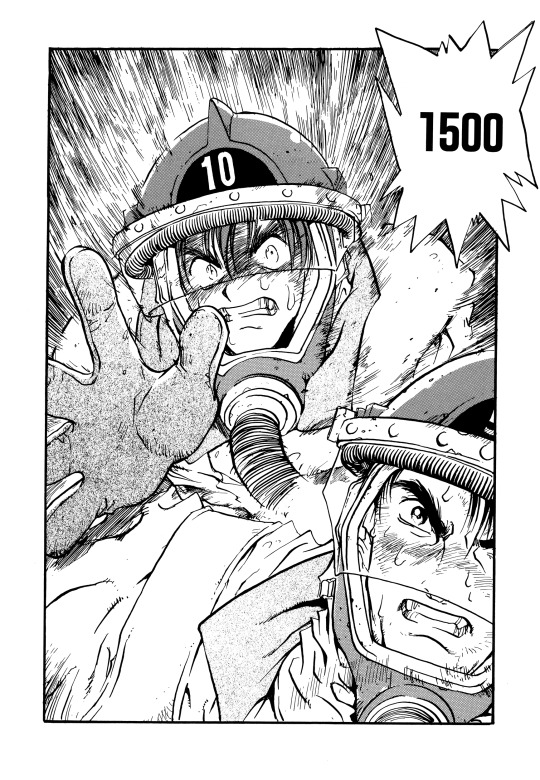

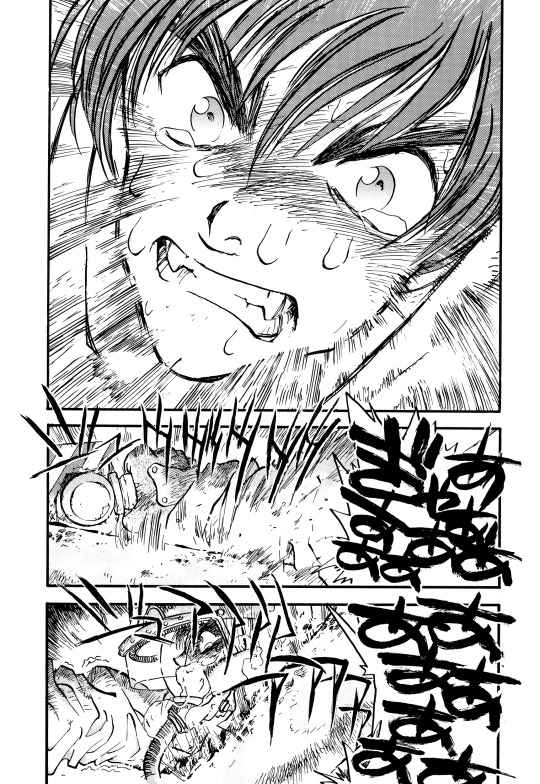
hm. a guide. and those sequences
we sure have a lot of guides here. one who appears in the manga later with a kansai dialect. and another in TriStamp, where he is younger than he appears.
when i spoke about hierarchy and the fact that vash is over 150, i was also kind of hinting that all of current humanity are akin to children in the system of JP hierarchy. that takes on extra meaning with a little change of context and language
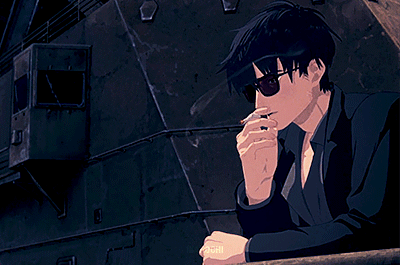
wolfwood is filling in the shoes of kaito here in tristamp. and within trimax, kaito foreshadows him. incredible.
theres actually more going on with wolfwood and certain design/changes choices i wanna talk about with tristamp but ill save it for another day. maybe when i run into him in this read later
Plant Synchronization downside.
....so theres a bad downside to vash synchronizing with the plant that i didn't catch. which also answers what the fuck was going on in tristamp when that version of him hits the ground
nightow mentions this in an interview, link here posted and transcribed by xoxo-otome (thank you!) that he likes action flicks and has incorporated a lot of action into his work. and its true. there is so much action in the form of sound effects.
reading through the entire manga and paying attention to the sfx peppered around offers a lot more context to whats happening in half of the panels that seemingly doesnt make sense
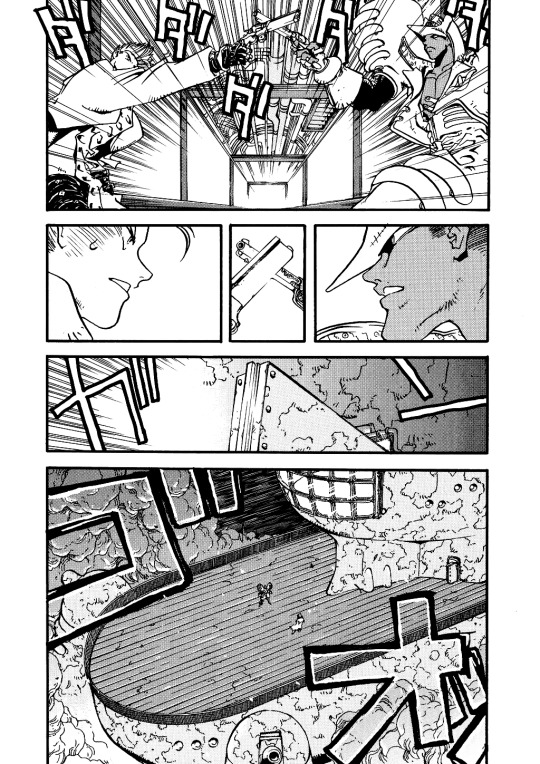
like this one where the top panel has "DADADADADA" sfx. so they're stomping down the corridor with their guns crossed and facing each other. the "GO OH" in the bottom panel emphasizes the sudden burst into open air. unfortunately, anyone who values their life and sanity in this economy will not want to translate trigun's sfxs 100%.
i should have paid more attention when reading trigun in english. but i didn't so here i am. in the trigunbookclub tag now doing this.
why is it important? here. this. below. when vash does his plant thing with his sister:
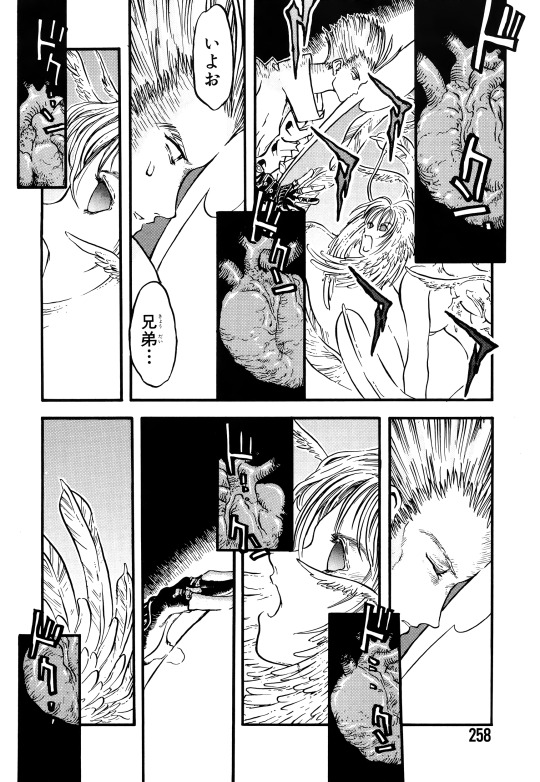
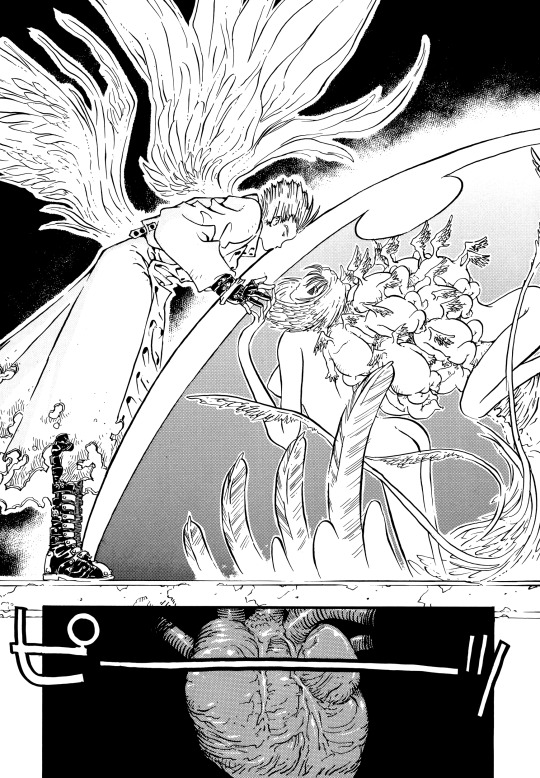
see those heart panels? i tried searching real quick but nobody seems to have pointed this out. i havent seen this in EN fanfics. maybe i missed it. maybe im stupid:
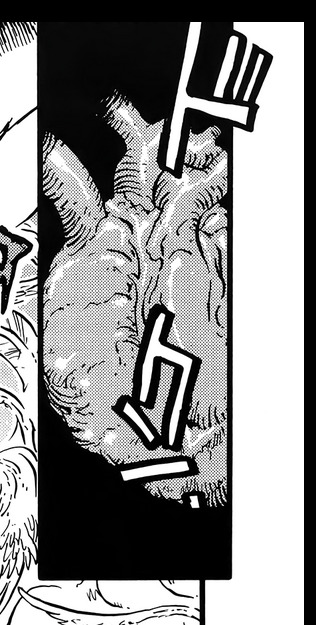
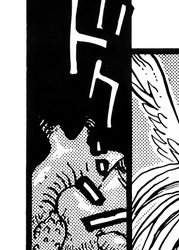
thats Dokun, the sound effect of a heart thumping. as vash synchronizes, the heart panels with the same sound effect appear, but they gradually split apart further with ellipses "..." to signify his heart beat slowing down. and down. and down....
Dokun, do kun, do... kun....
then the wings comes out. and the panel below it:

sfx: PIIIIIIIIIII
breathes. a FLAT LINE.
aaaaaaAA?!

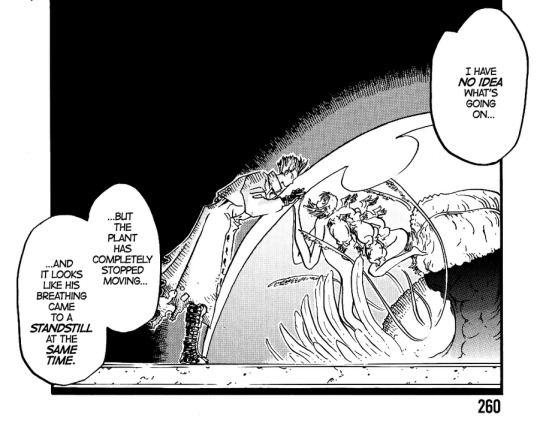
何かなんだかわかりません I'm not sure what's going on. とにかくプラントの動きは一切止まっています But the Plant's movement has completely stopped. 同時に男にも呼吸 心音ともに停止してます It's the same with that man. His breathing and heartbeat sounds like it's stopped with the plant too.
AAAAA?!!?! the も means vash is in the same state as the plant?
i.... um. um.,, ANYWAY-


AAAAAAAAAAAA?! HUH?! HUH??? HUH?!

is THIS why he has a metal grate over his heart? something happened and he an an operation on his heart???? by some engineer maybe? what? huh? am i reading this wrong? what? wait, hello? HEY!!!
what the fuck. okAY--?!
and then he just. pretends like nothing's happened. doesnt tell kaito anything. and he leaves the Sand Steamer.
and im going to have to sleep bc its 5 am now and pretend like i didnt just realize something this big right in front of my eyes during the first read.
41 notes
·
View notes
Text
Non-patriarchal masculinity and manhood
I haven't made a post about feminist theory in a bit, so let's do this.
I am speaking on the subject of people who are masculine-inclined or who are men at least some of the time. I speak especially about the cultural impact of people who do these things in ways that defy the expectations of the patriarchy.
The patriarchy is utterly dependent on a rigid, binary hierarchy. You have cisgender men on top, and you have everyone else below. This hierarchy is based on a belief in the union of sex and gender - men are male, women are female, and these traits are assigned at birth and (ostensibly) determined by one's chromosomes.
Only one specific kind of man is the recipient of the true benefits of the patriarchy. In America he is the Christian cisgender heterosexual abled white man of moderate or better means. He is the only class of man that is allowed to access the penultimate form of patriarchal privilege.
So what of those who "should not" have access to the privilege of American Patriarchy? What of those who ostensibly have access to some or all of these privileges, but are doing manhood, masculinity, or maleness "wrong"?
They are threats.
This is where masculinity, maleness, and manhood can become axes of oppression, not axes of privilege. It is unfair in any feminist analysis to claim these things are always forms of privilege when the world blatantly shows they are not. This inversion is expressed in many ways. I cannot possibly list every single example, so the following is an incomplete list of examples that I encourage others to add upon.
Cisgender butch women do not gain male privilege for performing masculinity, because females are not supposed to be masculine.
Black men's manhood is used against them for the same traits revered in white men.
A trans man is not granted male privilege even though he may in fact be male because the patriarchy does not recognize him as such, except to assign fearful traits of anger, violence, and disgust to him.
Trans women do not have male privilege either - and just like trans men, the patriarchy uses masculinity and malehood against her by leveraging the most violent, feared parts of maleness, even though she is not male.
Intersex people are oppressed no matter what choices they make, because they fall outside of the rigid sex binary demanded by the patriarchy.
The patriarchy will gladly be a hypocrite. It will uphold a certain type of man as the ideal, then use his very traits to demonize those who do not remain in their assigned place, or those who break the rules. People who violate the rules represent an existential threat to the patriarchy.
And it is possible, in so many ways, to be masculine, male, or a man, in a way that the patriarchy does not approve of. It is more important than ever that we do so, to stand strong, to fight against the patriarchy.
18 notes
·
View notes
Note
More Hadeon lore?? I love them sm
aaaa i love to talk about my dumb babies dont give me any excuse..
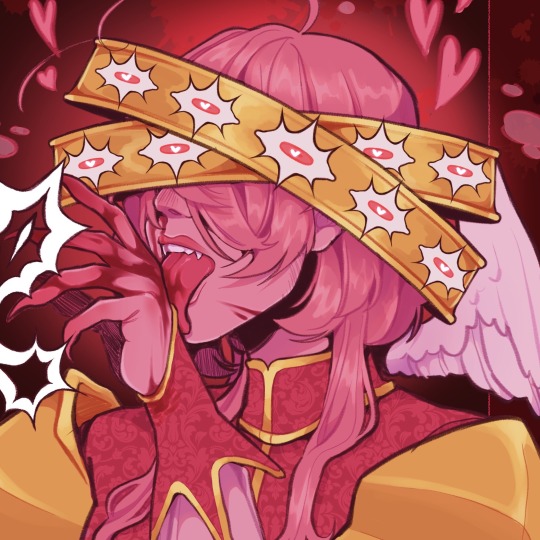
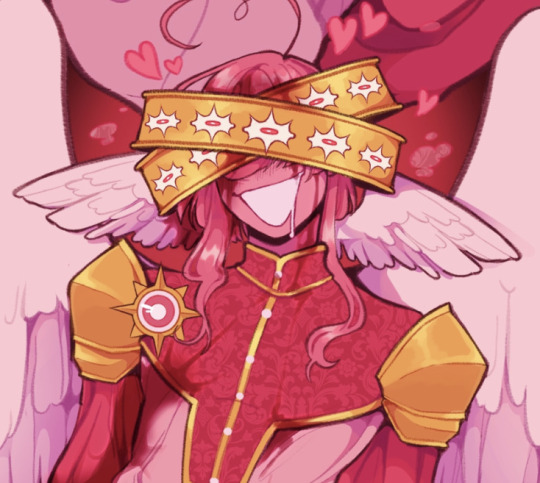

She’s actually part of like. a whole Thing. which i will now ramble about for ENTIRELY too long, so ill put it under the cut
ahhh im so bad at explaining things even tho theres like. a lot of lore & worldbuilding (by my standards anyways)
but basically all of my angel & demon OCs are part of an idea i have for an rpg/ttrpg?? set in a world where God, angels and demons all exist in the world, mainly in a sort of eldritch sense. God has essentially gone missing for thousands of years - with only scattered miracles to occasionally make Its presence known - and in Its absence, the angels have taken on their own warped interpretation of Its edict while the demons have wreaked havoc, and both have entwined themselves very heavily into human society (mostly to humanity’s detriment).
The players would create a character (human((religious, cult, or agnostic)), fallen angel, redemption demon, etc) that would give them certain skill sets/abilities/affinities depending on their choices, but the overall goal of the game is to Meet/Find God (and your characters reason for this would vary)
The continent in the game is basically one enormous mountain range, with the peaks actually reaching the heavens (think like olympus) with those living closer to the peaks being basically ultra religious societies who still believe God is there and everything that happens is still somehow part of Its plan, and those at the base and few small surrounding islands (which deal with much more demonic corruption and angelic attacks) doubting It still exists, and becoming home to fringe groups of cults creating their own deities (sometimes literally) and agnostics.
Players would meet somewhere at the base and progress up the mountain, and - depending on their group make-up - meet angels and demons along the way, both of which could potentially be foes or allies.
The angels exist in a hierarchy, with the seven Seraphim at the top, but almost all of them pose a potential danger. With God no longer at the reigns, the angels have had centuries to interpret Its will however they see fit. Many of the lowest ranking angels still hold the original ideals and are mostly harmless, granting blessings and offering sage advice, but are of no Real help. Of the higher ranking angels, many have gained their own twisted sort of moral compass and have lost touch with Gods original love for mankind. What is or isn’t a sin, what deserves punishment or what deserves blessing, has become subjective to them and they bestow their judgment upon mankind with great prejudice.
The demons exist in a hierarchy as well. As angels stripped of their holy power (and thus blinded) when they attempted to overthrow God, they seek to earn back their power and sight by stealing souls. The harder to corrupt a soul is, the more power they obtain when that soul finally succumbs. Lower level/weaker demons mainly seek to cause wide spread devastation and death, as they dont have the power to corrupt, but feed on any souls lost. Higher level demons are more insidious, possessing or manipulating people in power, in search of “higher quality” souls to assist their climb.
There are also a small group of “fallen” angels and “redeemed” demons, who exist sort of outside of the status-quo since they no longer fit neatly into either group. Fallen angels are (usually lower ranking) angels that have fallen in love with humanity and rejected their base angelic nature to live amongst them. They forfeit most of their angelic power and assume a more human-like appearance in order to live amongst the humans they adore, but have a still-perceivable “otherness” that leaves them mostly an outcast. Redemption demons are somewhat similar; they have gained/retained enough love for humanity since their fall that they no longer seek to claim human souls for power and are instead attempting to regain Gods love through redemption and acts of kindness. Falling from heaven has irrevocably changed them physically, however, and they face great hardships attempting to fit in to human society.
Of the Seraphim, Hadeon represents the Wrath of God. He is tasked with finding and punishing sinners, those who would blaspheme or turn against God. Originally she was the fair hand of Justice, but in the centuries of Gods absence, his sense of right and wrong have become irrevocably warped. Their presence can first be felt with the smell of ozone, and a sudden intense pressure, like a storm on the horizon. She, and the army of angels under her command, hunt sinners through the streets, meting out their vigilante justice. Where he goes, indescriminate bloodshed almost always follows.
Her mindset is entirely black and white, but despite eons walking the earth they retain a naïveté of human society that makes her pretty easily distractable. He can occasionally be reasoned with and/or distracted, and even more rarely convinced to bestow a blessing.
Hadeon is one of the first Minor bosses the player faces, and your decision to either befriend, escape, or kill her will play a role in your later encounter with other higher angels.
obviously there are all of the other Seraphim, and other high ranking demons that have their own names/info/etc i could literally keep going on and on abt them & more in depth world building forever probably but i will stop now 😔
#this is technically an old anon but. i want to talk about my dumb worldbuilding so now u all have to look at it ty💖💖💖#asks#my art#oc#oc: hadeon#if any of u actually read all of that i owe u my first born child or smthn fjfjfj
143 notes
·
View notes
Text
Kuroshitsuji: an analysis on "fagging" and a change of power dynamics between characters
I know how disappointed some fans are regarding the "politically correct" presentation of Ciel and the overall "fagging" culture that was common back then at elite boarding schools in the UK. From what I have heard from people slightly older than me, this was a thing that carried on into the late 90s in certain private schools. As of now, I am sorry, I don’t know anyone rich enough to ask them regarding those things.
However, what I can say about this matter is that a) this practice is can be found almost anywhere in the world (mostly in universities), b) it is about power exchange and how it leads to respecting tradition and bond with other students, c) I am part of it in my own university and d) it’s deliciously represented in Kuroshitsuji, in a way that somehow gives us a different perspective over what Ciel can and cannot do, limiting his actions, something that he, as a powerful noble, is not used to.
Fagging
In many countries and cultures cross the world, "fagging" has many different names, and many different forms. In the US you have fraternities and sororities, here in my country you have the "Praxe". In the UK you have (had?) fagging, in which consisted exactly on younger students doing most part of domestic tasks that were supposed to be made by older students. The older the students were, the more power and status they gained inside the institution, and therefore the more privileges they had. In consequence, although these fags didn’t have an easy life, they still had some sort of protection and status themselves for serving someone older. This creates an hierarchy based on age, more specifically just academic age.
Ciel, as being someone young is, of course, at the base of this hierarchical system. Someone who is used to be at the top of the hierarchical ladder is going to struggle to adapt to a new environment, one in which he simply cannot understand/agree with the traditions imposed. This will create a certain obstacle at first, because he needs to learn how to navigate in a different society so different and, at the same time, so similar to the one he belongs to: the only difference being where he stands. And we see Ciel, for the second time in his life, working himself from the the way down to the way up.
In the first time, his birth condition (well, let’s assume we are speaking about Ciel’s condition, and not o!Ciel’s one at least) gave him a kickstart in life: a manor, monetary goods, a title. In this case, he is a mere 1st year student, and he must subjugate himself to the desires (sometimes sadistic) of older students, especially Clayton at first.
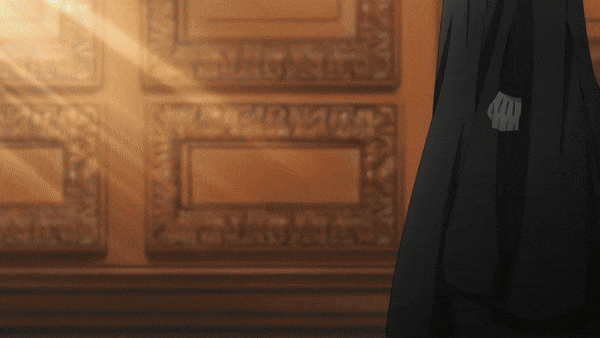
Psychological Implications
It may be complicated from Ciel, even more taking in consideration how prideful he is, to swallow that pride and abide by traditions he a) doesn’t relate to b) finds useless and c) seeing himself without a lot of power to swiftly surpass those obstacles. Ciel is not there in order to live the academic traditions that are present around him, nor to make friends, of course. And, in the end, fagging and these other academic traditions open the door to just that: when people suffer together they usually stick together. This is the meaning of fagging, Praxe, and all the other academic traditions listed. And this is not what he is searching for. Which puts a little bit of strain on him, and he ultimately might think they are extremely childish and ridiculous.
Another interesting aspect of this overall power exchange here is that Sebastian is in a higher position of power than Ciel, as opposed to their base situation. This is, of course, extremely debatable, and the power that each one of them holds in their master/servant (no, I am not talking about that sort of thing… eww) is quite mutable, and, at times, one may hold more control over the other, and that is changing. Here we have a third factor contributing to that mutable power exchange: a different environment, where Sebastian’s position allows him to be seen as more respectable. And this is extremely delicious to see when he lets Ciel undergoing the initiation ritual with the bedsheets and being thrown: Sebastian is, obviously, enjoying himself at the expense of his master’s suffering, since in normal situations he simply cannot do that, at least not as frequently. To Sebastian this is cathartic, and to Ciel (Sebastian’s master) this must feel extremely insolent. Especially because Ciel is someone who likes to always be in control, having in consideration all he went through.
Undergoing this traditional upbringing will, hopefully, provide Ciel either the necessary tools regarding being more self-reliant and independent when it comes to Sebastian because, even if the demon is able to help him out with all the domestic tasks that he needs to do, who knows what will happen when Ciel loses (even if just temporarily) Sebastian one day (which, as another post explained, it might happen sooner than we think).
By being a fag and by navigating a position in which he is in a lower position, Ciel can’t find many shortcuts to success, and he will need to a) rely on his interpersonal skills, b) make connections with other students, c) be aware of what’s going on, socially, around him (read the room) and d) use his insight more than the sheer force and threats of Sebastian.
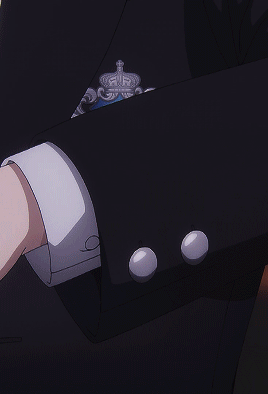
#kuroshitsuji#black butler#ciel phantomhive#public school arc#anime#manga#meta#analysis#character analysis#writing#culture
61 notes
·
View notes
Text
Another pro-reader tip for mxtx novels: they are all stories with clear-cut good guys and bad guys and a strong moral message, BUT you have to actually read what the story has to say about characters without taking anything at face value, relying on genre tropes, or using identities and statuses as shorthand to your understanding of the moral system and themes of the story. So no, most characters in her stories are not morally gray (though some are, most can be definitively categorized as either morally good or bad, and ALL of her main characters are definitively morally good), and no she does not write morally gray plots where “morality is just subjective!” If anything, the term I think people are looking for is “morally neutral” (meaning that the thing is not assigned a morality in and of itself) in many cases.
An mxtx character is never designated as good or bad based off their backgrounds or class: Wei Wuxian, Jin Guangyao, Shen Jiu, and Mu Qing all grow up outside of the elite class, but Mu Qing (eventually) and Wei Wuxian are unquestionably good guys while Jin Guangyao and Shen Jiu are unquestionable villains. Shen Yuan, Lan Wangji, and Xie Lian all grow up within the gentry class but are all good guys while Jiang Cheng, Jun Wu, and The Old Palace Master are bad. Likewise, life circumstances or tools don’t determine morality. In mdzs, the sword path (which is the orthodox one) is used to commit genocide by the general cultivation world just as easily as Lan Wangji wields it to protect the forsaken commoners. Wei Wuxian’s ghost path was created to protect himself before being used to protect others, but Xue Yang and the Jin Clan pervert it to cause mass destruction for their own wishes. In tgcf, Xie Lian uses his god powers to attempt to help the Yong’an people while the other gods simply collect worshippers to increase their power and oppress lesser gods. Every character I’ve listed minus the Old Palace Master has experienced intense trauma that has informed their lives and colors their morality, but it does not define why they have chosen to take on certain moral stances.
(This is not to say that mxtx doesn’t have certain tropes she dislikes, as she clearly hates the “dedicate their whole existence completely to another person” trope. Su She, a villain dedicated to Jin Guangyao, dies. Zhuzhi-lang, a sympathetic antagonist dedicated to Tianlang-jun, dies. Hua Cheng, A WHOLE LOVE INTEREST dedicated to the literal main character, dies a whopping three (3) times before he learns his lesson.)
Mxtx does not condemn those who stray from orthodoxy. In fact, every story she’s (currently) written is about the dangers of entrenched and unquestioned hierarchy and status quo giving way to corruption every time. She wants you to question the dominant narrative of the benevolent group who descend from on high to “save the ignorant masses.” She wants you to question the idea that the only people with the right of choice are those at the top of the hierarchy. She wants you to question the idea that even the smallest decision of “powerless” people does not matter in “the grand scheme of things.” She wants you to actually think about the story conventions that you accept as infallible and question whether or not it would make for good shorthand by which to understand well-written characters and story arcs (and also, hopefully, how society is structured at large). So if you find yourself reading an mxtx novel and siding with the mob characters or lamenting how x character was locked into making certain choices “against their will” or being unable to reconcile how a recognized trope led to an unexpected conclusion because “that’s not how it’s supposed to go,” then it may do you some good to stop and ask yourself “was this idea supported by the narrative that I read in the book, or is this an idea I’ve come to entirely from my own preconceived notions of how I wanted the story to turn out based on how other, similar stories have panned out?”
#human metas mxtx#mdzs#svsss#tgcf#and this isn’t to say that you can’t question mxtx’s choices#again her work BEGS you to do just that#but you can’t have an adequate critique of something you refuse to even see for what it is#if you are expecting a normative genre piece from mxtx#you will leave disappointed with the ways in which she specifically breaks those norms#you will walk away without understanding how or why she chose to do so#and you’ll misunderstand her intentions and her works by foregoing this understanding
492 notes
·
View notes
Text
Gortash Week Day 2 - Worship/Betrayal
The inside of the church’s inner chambers was near black, befitting of the Black Lord. It also did a great deal to disguise a certain creeping age and shabbiness in the theoretically opulent furnishings, though it could not escape Enver Gortash’s critical eye. The congregation in Baldur’s Gate had always been small and thus tolerated by the civic authorities for its insignificance. This insignificance, in turn, ensured it received little and less in the way of funding from the higher clergy. There had been attempts to combat this, of course. But they had lacked vision. The whole of it was lacking, archaic, and insisted on clinging fast to crumbling stone. He would see an end to that nonsense.
A figure, enrobed and enthroned at the massive oaken desk that bore the room’s only lamp, resolved itself as he approached the back of the darkened room. He bowed deeply, as appropriate, and waited for the figure to speak.
He hung suspended for a long, lingering moment as the man’s quill scratched without pause. A deliberate show, he knew, meant to emphasize their difference in rank. Icar Exeltis was nothing more than a wastrel. A disreputable third son with little access to the family coffers playing at power. The man lacked imagination, lacked a deft touch, lacked the will to truly wield power yet held the highest church office in Baldur’s Gate thanks to his name. The church had shriveled under his headship, but he had seen no challenges from the congregants. He was a patriar and son of the last Dark Imperceptor besides. It was his place, they held, in the hierarchy – and thus they must submit unto the order of things. Or so the old blood said. The new blood could see. The new blood chafed against these dynasties old and rotting.
Dark Imperceptor Exeltis finished whatever inane nonsense he had cooked up to occupy him so, at last returning his quill to the inkpot and setting his letter aside to dry. He made a show of shuffling papers on his desk, placing them in one pile or another according to some whim all his own. Gortash knew it all to be thoughtless. He was well aware of those who actually handled the sort of useful paperwork necessary for running any sort of organization, well aware of those who offered value. Serviceable people. For all this man’s insistences at rulership, all the time he spent faffing about with obnoxious make-work, he ran nothing of the church. Not in all the million little practical ways that mattered.
His desk cleared at last of his dross, the Dark Imperceptor wound his languid way around his desk to lean insouciantly against the front of it, weight braced against his palms. “You are seen in this place, my Willing Whip, by both my eyes and the Lord Bane’s. Now give us the obeisance we demand.”
Gortash dropped to his knees without hesitation. He must keep the game going a little longer, and it would not serve him to balk now at this last moment. Pride and scruples were for other sorts of men, men who did not see the greater whole as he did. What was one moment, one lie, one simpering smile in the face of a lifetime? He kept the proper forms and pressed a kiss to the top of the man’s proffered boot. He sat up, the picture of the wide eyed naif he must soon no longer play, not here.
Exeltis ran a hand through his hair as he returned to his kneeling form, his hands so smooth from lack of work that he had no calluses, not even those of a dedicated writer, to catch upon the strands. “It’s good to see you on your knees, young Gortash,” he said, voice rough with desire.
Gortash remained kneeling. He must, until this claimed superior gave him leave to rise. “We are all well suited by our proper place within the hierarchy. You, for example, have always been at your most imposing like this.” He looked up at the man through lowered lashes, a calculated coyness. “It flatters you so well, Dark Imperceptor.”
The idiot was blind to his own failings, and thus agreed readily to falsehoods. He preened pathetically at his false complement, with no more thought in his head than in an ornamental bird’s engaged in the same. “I was born suited for this,” he agreed, his hand still stroking through Gortash’s hair. “We’re of a better sort of stock. Our birth entitles us to stand above the rabble. It’s good to see you know this, pet.”
He continued his irrelevant and incorrect rambles, coddled in the warmth of his self-delusion. But Gortash was not listening. It was not his usual tune out for his own sanity. No. He’d seen a flash upon the back wall, a hint of light in all this black that would never have been allowed were there not exceptional circumstances. He knew those exceptional circumstances, arranged for them himself. He knew who it was standing on the other side of that door. All the pieces in play at last.
“My lord,” he started, “I heard something in the antechamber just-”
“Insolent!” Exeltis hissed. “To think to use a lesser title for one of your betters! I ought to see you flogged for such impudence.”
He raised a hand as if to strike Gortash, but he had played supplicant long enough. And now, with his little army just outside the door, he was free to return to his proper place. He stood. “Oh, hold your tongue,” he told him carelessly. “Who are you to declare that the title of our Lord is too low to suit you? Dark Imperceptor, Grand Bloodletter, Vigilator, this is nonsense. I tire of this hysteria for titles. Lord will do well enough for us, as it does for Him.”
Exeltis was near gibbering with rage, spouting half remonstrations that he was too apoplectic to finish. They mostly concerned his failure to observe the proper hierarchy and indeed, the general conventions of propriety. “You dare,” he managed, spit flecked, at last. “You worthless, lowborn little whore, you dare speak in such a way to me? I will see you hanged for this.”
He does not understand, Gortash thought. He does not see the way the current had turned on him. He has not noticed the glances. He has not seen the others draw away. It has not coalesced yet, not for him. How delightful.
“You haven’t noticed,” he breathed, making no attempt to hide the relish in his words. “I suppose you shouldn’t have. I’ve been very careful, you know. But surely, I thought, surely you had to have guessed. Well then. Allow me, Icar, to enlighten you about your past and future.”
He grinned, wide and sharp. “If you were to look in the drawers of that desk you’re leaning on, you’d find so many interesting things Icar. You’d find them in your house, too, if you looked there. Every inch of it, all the way down to your bedchamber. It’s even in each and every one of your nasty little bolt holes. You’ve been so very profligate with this very, very sensitive information. How dissolute of you, to hide your tracks so poorly. But you’ve gone and done it, left evidence of your crimes all over the Gate from the hills to the harbor.”
“I haven’t done anything, you idiot,” Icar snarled at him. The man still hadn’t caught on. He still hadn’t realized what he was dealing with. An irredeemable failing in a Banite. “I don’t know what nonsense you’ve gone and gotten in your head but there is nothing to find because I have done nothing wrong!”
Gortash laughed, let the shimmering ecstasy of it roll off his tongue. “Like that has ever mattered,” he said, buoyant on a sea of victory. “But perhaps more to the point – I know the evidence is there because I put it there. I put it everywhere. Piles and piles of it, in any place you’ve ever so much as stepped foot in. And then I went to the rest of the leadership, ever so concerned about the things I’d found. I had seen things, I told them, things that implied that you were not so committed to our Lord as you professed to be. They went looking and found all that and more. You’re to be brought before the Black Courts on charges of apostacy and intentional sabotage. They will see you convicted on overwhelming evidence.” He leaned forward, pushing into the man’s space and sending him quailing backwards. “And while you are busy with your sham trial, I will be sitting on that throne of yours, shaking things up around here.”
There was fear tempering his rage now, Gortash could see it creeping through the man’s eyes. He rallied admirably for a fool. “They’ll know it was you,” he insisted defiantly. “And you’re nothing, Gortash, nothing. They’d never make some low-born rat whore like you Dark Imperceptor.”
“But that’s the brilliance of it, don’t you see? Who could ever suspect the lord’s young favorite?” he laughed again, the triumph of it sweet as honey. “Ah but you underestimate me still. I’ll have the recognition for this to trade on, and I’ve been making allies, Icar. Willing and unwilling. So many secrets in these halls and I know all of them. They’ll pick me. They won’t have a choice.”
The rage had now been swamped entirely by the ever-growing tide of fear. Icar could barely manage a pathetic whisp of a protest, but he tried nonetheless. “Someone will figure it out. They have to,” he gasped out between shaking breaths.
“Some will,” he agreed amiably. He would certainly mark this chain of events as suspicious and had no doubt that others would as well. “But those who can put the pieces together will respect me all the more for it. They’ll have promotions waiting for them to the last man. I have need of talented lackeys.”
There was a single loud rap upon the door. The final signal. He straightened up. Icar remained half bent backward over his desk, mouth gaping open like a particularly dumb fish. “That’ll be them,” he said. “Enjoy the Black Courts, darling. I’ve heard ever so much about them.”
They piled into the room, every high ranking Banite and their bodyguard (he’d need one of those himself, soon). They did not bother to list the charges. All here knew it did not matter. Icar went with them quietly, out of either shock or fear, and the whole thing was discharged so neatly and efficiently that Gortash found himself alone in the inner chamber within no more than five minutes, all told.
He turned to the altar at the back of the room. It was a simple thing, made of a solid, glossy block of black obsidian, all the more imposing for its austerity. He knelt before it and pressed a kiss to its base as he had knelt before the former Dark Imperceptor not more than moments ago. “I hope this has pleased you, my Lord,” he said. “And that it has shown you the value I bring, how well I keep your tenets. You see now only a fraction of what I can do in your name. Lend me power, my lord, that I might further bring your order to the world. That we might throw down these petty pretenders, these puppets grown fat on easy slaughter the strength of a true ruler. Let us glut ourselves upon their fear before they are ground beneath our unstoppable rise. Let us see them weep.”
At first he thought there would be no answer. But then he felt it, felt the darkness thicken and densify, felt it curl around his throat as if to crush it. But it stopped short, stopped at a pressure that would not kill him but would let him feel each and every one of the five fingers that extended from the broad, black hand to encircle his throat.
You will serve, the voice said, as all must serve. But first, a lesson. The hand tightened. Spots danced in his vision. There is no we, boy. There is only me. You are a fleeting thing, born only to serve. And serve me you will. Ably so, young Gortash. I look forward to your next offering.
The hand on his throat vanished with the voice. “Of course, my Lord,” he said to the altar. “Of course I will serve. That is the purpose of those born to my station.”
Gortash smiled alone in the dark.
“I would never seek for more.”
30 notes
·
View notes
Note
The Lambchop World is so fascinating and cool… but I’d like to know more about it as well! What’s the economy like there? Do people still have jobs, buy and sell stuff like supplies, clothing, food, etc… just like they do in Stella’s town?
(Also, speaking of which.., is everyone’s wardrobe that emo/gothic? Did Lambchop force it to be? Because I love Stella but those clothes are REALLY not her style! I really hope that Lambchop didn’t force her into wearing them… that’s leaning a bit too much into “toxic relationship power imbalance” for me)
What’s the general attitude of the population? Are they all violent, bloodthirsty and prickly besides Stella or do some of them retain their normal personalities? Do they lean in more towards their “animalistic” side (like Ruuuby eating Buck) or do they still eat normal food? …WHERE would they get normal food? Is it all meat and cannibalism??
Also, assuming that Lambchop goes after the whole WORLD instead of just a small village like Stella did… is death common there? Or does Lambchop resurrect them to “have some more fun” on his planet? Are his powers that of a normal Star witch as well? I’m so curious if it is!
And finally… what are Stella and Lambchop’s roles and relationship on this planet? Lambchop seems to live just like a common “resident” of that planet… getting into riots, street fights, etc. What does Stella do though? Is she just Lambchop’s personal nurse who takes care of him after he gets into fights or something?
This seems to be an anarchic world, so I doubt that their’ll be a government or any form of legal system there.., but I am curious if there is some sort of “gang hierarchy” on this place, like the most respected fighters are the rulers of certain territories and clans or something. It’ll make sense for his world, and I wonder if he’s in the “top hierarchy” or something like that, considering that he literally CREATED the world lol. Do the other residents have respect or are intimidated by him? What do they think of Stella?
P.S: Kinda a dumb question but are Stella and Lambchop in a relationship in this AU? Do they date and have a house (or a joint living area maybe) and live together or something? How do they treat each other? I like to think that Lambchop treats Stella…well, like allowing her a small garden to plant some flowers and have a semblance of normalcy in their home. Kind of like how Stella bloodied up her village for Lambchop, but much less drastic.
And for the million-dollar question: What on EARTH are the other Star Witches when Stella needs them??? Did they abandon her or something?
These are A LOT of questions, I’ll admit… Im rly sorry if this is too much :( But I’m just so curious about this world; the idea is absolutely fascinating to me!! Thank u sm for reading all this!! :D
oh this will be fun!! *cracks knuckles for the second time* I'll try to answer best I can!
-The economy is a bit strange. I think some people still kinda have jobs and make money, but money alone is probably not valued as much as "substances" or "favors" (Ex: "Get that fucker out of my bar and you'll get free drinks for the whole night" )
-Everyone's wardrobe is pretty emo-gothic, but I wouldn't describe it as a "Lambchop forced it to be" situation so much as. In the vision of Lambchop's perfect world this is just how society dresses. And so Stella dressing like this is more of a societally pressured thing. For one, there's probably not other clothing options. And if there is, dressing in a way that strays from the norm would be like affixing a giant target to her back--everyone would be trying to start shit with her. It's safer to blend in so people don't think you're soft.
-Most everyone is pretty prickly. And if they are "nice", it's a kind of niceness that incorporates violence into the mix--otherwise you'd be down for the count. Everyone's probably on "high defense mode" all the time and is just waiting for you to be the one that growls first.
-Most food is probably meat based. I don't imagine that everyone is just eating whoever they slaughter on the street (though some might) but rather there's some mysterious "meat processing" plants. Where's the meat come from? Don't spoil it by asking questions.
-I don't think Lambchop has any sort of special/magic powers that set him aside from everyone else. I think it's less of a "Lambchop controlling the world to be this way" and more of "The world itself shaping itself around his desires." Death is pretty common, though I hadn't considered the possibility of people coming back in this version too...interesting to think about.
-I think the possibility of some gang hierarchies exist, but I hadn't put too much thought into it. I do think some people might be more well-known either for being really good fighters and/or for starting trouble a lot. I feel like Lambchop wouldn't be the most well-known but might have a bit of a rep for being able to take people down.
-Combining some of your Stella questions into one, Stella's relationship with the planet is pretty...fraught. I think she's still got magic powers but they're nowhere near the the level of skill she's got in Sweet No Death. At most she can perform small magic, making things grow, levitating some smaller objects, etc. I feel like Stella's status as a star witch is vague even to herself--like maybe she got amnesia upon landing here, but she knows that things could surely be better than this... Stella tries to help people and sometimes they accept it and sometimes they don't, but when they do allow her to help she feels good inside and it helps restore a bit of her hope in the world.
I like to imagine that maybe Lambchop and Stella found each other when Stella was attempting to "fix" things instead of breaking them like everyone else, and Lambchop was a bit captivated by how different she was from everyone else. Stella would in turn see him as different from everyone else--less prickly, more smiley, and likes her company.
I think Lambchop and Stella are dating. They live in some dank, decrepit apartment building which probably isn't even owned by anyone anymore and they might be the only people in it. Stella's got something of a greenhouse on the balcony where she grows as many little plants as she can keep alive and can enjoy the feeling of fresh air for once.
Despite the general violence of the city and Lambchop preferring things this way, he and Stella have a pretty lovey relationship. They sleep in the same bed all cuddled up next to each other every night. If Stella is having a bad mental day (can't handle the stress of everything, being worried something really bad will happen to Lambchop if he goes out, etc) Lambchop will stay home with her and they'll spend the day snuggling and kissing and maybe working in her greenhouse. When Stella goes out Lambchop usually tries to be beside her. She's able to defend herself but he knows she doesn't *like* having to do that, so he doesn't mind being her bodyguard for anyone who would want to pick a fight with her. Sometimes they even try to go on dates outside despite how crazy everything is. When Lambchop gets into fights Stella bandages all his wounds when he gets hurt. She hates seeing him hurt but she loves seeing his smile as he recounts to her how he won. I think she uses whatever magic she has to help expedite his healing process.
-As for Star Witches, the thing about Star Witches is like...they are catty and judgemental but if you are another Star Witch they will not help you improve unless it benefits them in some way. They will come into your house and might adjust a crooked picture frame on the wall, but they won't clean up your kitchen or tidy up your living room or do your yard work for you. If they were to see a world like this they would not help it try to get better because it is not their monkeys, not their circus.
#i hope i answered everything?! i think?!#this is fun#this also goes under the assumption that is a different way for their world to be#rather than stella doing anything to make the world this way FOR him#maybe she'd do this as like a birthday present for a day idk#sweet no death#witchywool#stellamb#stella#lambchop#ask
70 notes
·
View notes
Note
A question I've had since I've been watching ur Roseverse content is: In RV there's a clear divide between mortal Sanses and immortal Sanses from what I can see, especially when it was talked about in the pilot. This begs the question: Is Ink actually a mortal? Because it's canonical that Ink was once a *child* and *grew*, and it's also clear Ink is also still soulless in RV. If he isn't mortal and is indeed immortal, does that mean at one point every immortal Sans was once a child and *grew* up? If this is just a personal choice of writing/characterization I'm not critiquing or hating on it! It just intrigues me very much and raises some questions
Hello! I figured I would eventually get questions along these lines, and sometimes I forget people who arrived from the pilot wouldn’t know this, so here is some RoseVerse lore building that was in the OG lore doc:
Immortal beings are split into a wide variety of groups, species, and classification. There’s a hierarchy between them, with Fate and Destiny at the top and Player and Core Chara at the bottom, right below Core Frisk. For mortals, respect is given to all immortals. However, due to this hierarchy, those at the bottom are ignored or treated as less than by those with more power. It also means they have less connections to aging natural if you’re lower on the scale.
Player, Core Chara, and Core Frisk are examples of corrupted codes making them forever stuck at the age of when they became an immortal for the first time. They had to die in order to live forever- as they are kinda like Geno (their bodies are forever stuck in time and paused) So, they do not mature past the age they died nor grow. They are called Demi-gods in the lore- or simply deities.
With full Gods, it’s not about bloodline. You meet the qualifications of a god if you are immortal, and you posses power over a certain idea, function, or way of life that sways the lives of the mortals. Ex: Reaper isn’t considered a god just because he was born from another- but because he’s over the concept of Death and serves as a reaper. Some are created as adults while others are created as children. The Reapertale God structure is based off of Greek mythology where child Gods were still birthed/created and grew. Ink is not from Reapertale, and is ranked below the Reapertale gods, but he’s still considered a full god due to him being over creation.
Ink was a god that was created and popped into existence at four years old due to insufficient power from his creator. He had a soul as a child and when Error found him, he was also in the midst of still growing too, as Error was only nineteen. Gods completely reach maturity at 25 years old, and it takes them many centuries to actually reach that age, much longer than humans. It’s why little gods are not typically created without someone able to look after them- and they have a special aura about them that makes them latch onto the first person they see so they can grow. Call it a parasite…but that’s just how they are. Little Gods are still able to die, especially since they are so young. They aren’t in tune with their magic, and a fatal incident will kill them or leave them permanently disfigured. It’s a survival instinct and magical ability that keeps them safe and keeps their distracted godly parents hyper focused on them until they reach 13 and can primarily fend for themselves. (Keep in mind they are Gods. Though they don’t fully mature until 25, they are still able to fend for themselves a lot more than a fully adult human, even as children. Once they aren’t as delicate, the parents don’t constantly need to look after them- which is why Reaper was forced to start working more when he reached that age.)
Error latched onto Ink due to this aura, and became his older brother instantly bc he was overcome by the need to take care of Ink. Like reverse imprinting
He does genuinely care for Ink- don’t get it twisted. Even if Ink didn’t have that aura, Error would be less inclined to leave him behind. But in “Wilted”, Error would not have saved Ink from getting run over if Ink wasn’t an god child. However, he felt like his whole world was going to shatter if he didn’t save him- so he did.
It’s also why Error hasn’t recovered from Ink’s assumed death. Ink was only 11. He wasn’t ready to be on his own yet. Error feels like a failure both mentally and also instinct wise, and that grief is horrid and painful. He lost his baby, and failed as a guardian and a God by letting a godly child disappear like that. It’s…rough. Nightmare deals with a similar type of grief emotionally wise, but not so much instinct wise. He misses Ink everyday, but in a typical grief way (not belittling what he deals with. He mourns him greatly and loved him like his own kin. He’s just as hurt as Error is in that regard.) Error’s is just…more…extreme
How Ink lost his soul as an adult tho? Cant say that yet…
#undertale#undertaleau#undertale multiverse#roseverse#cooling rosa answers silly stuff#nightmare sans#error sans#ink sans#RoseVerse lore questions
15 notes
·
View notes
Text
I've kind of want to explain how the whole hierarchy in "the streets" lines up in arcade.
The street is quite a wide area. There is a vague map for arcade. One that I haven't quite drawn out because it's so big. But the general look of it places Fall fest as far away from the streets as possible. While It is relatively right from Stardust arcade, and is somewhere smashed between Sundowns location, and planets old location. Like I said it's quite big. It takes quite a lot of space, and mingles in quite a bit of other locations areas. Stardust Arcade is one part of its edge, with warehouse taking the other side.
But onto the hierarchy sort of stuff. Certain locations are included in this hierarchy because of how mingled they are in the streets area. So don't be too confused if I mention a certain character that definitely is not wild and on the streets.
Top of the list is sundown. Sundown lives in this spot where he's basically made deals with nearly everybody and nobody is willing to sacrifice the peace of being able to get repairs for a cheaper buck. Also the fact that he's the best repairman in miles. Not even people outside of the streets necessarily mess with him. Although I will note a lot of locations dude just get more protection due to being a location. And are more so troublesome areas than they are ranks on people inside them.
There is then planets old home. But it's not necessarily her old home that is on top. It was her. But nobody in the streets has gained knowledge of her transfer and has just stayed away from memory. But planet was known as the Queen of that area before she left, and her lingering rain remains.
Red blue and blacks location is the next one on top. And this one is actually a blend of location power and a actual enemy to watch. The location is of course big enough and watched enough that no one messes with it. But similar to planet Blue Moon has made a name for themselves. It's not just the location that's off limits. It's the area around their location. Blue Moon has become the ribbon devil and no one wants to wander in their space.
Warehouse is also technically on this list. But it's more so an area known for its security than it's rank. A similar thing with Stardust arcade. Warehouse is more of a target due to it being out in the boonies. But the constant patrol of multiple animatronics has made many wary. A similar thing with Stardust. Simply too many people there's too many things to watch. Including the fact that it's in a very populated area. Which is why the whole hierarchy of the streets is less known to Stardust than is to warehouse.
Getting onto actual people, packs, and locations housing those. The last real location is the old abandoned robot factory. It's more so a peace center or epicenter of everyone on the streets. It is in the basement of this area that ravenous was found. Plenty of different packs and strays come to the building for safety. There is a quiet rule to not attack anyone. But it's more so a courtesy. The deeper you go in the facility the less safe it becomes. It's an interesting dichotomy.
Ravenous would technically be considered the most terrifying being on the streets. If they weren't trapped. But this is more so a side note of where they could be.
The next is the MVP. The Neptune pack. Once you get out of the realm of locations they are definitely the top dog. No one wants to mess with them, and no one wants to get in their way. The hotel they've taken over is left baron and alone. And the Neptune pack nearly patrol every single area of the streets. There's not really a way to be out of their way. Unless you go to Stardust or warehouse, You're stuck just having to deal with them.
Next is the sulky star cluster. I'm sure this is a surprise but they're more so considered a pack to the street. They are basically delinquents. And while they definitely won't mess with the Neptune pack. They are practically on the same level. It's mostly given to the fact they have homes and therefore can afford a lot more than most packs can. And technically they also hold a lot of power over the locations also. Characters like Blue Moon, Planet (If she was still there), and others are under their fists just because the sulky star custer can actually talk with the locations. But of course they don't have actual control over them so they're down here.
Next is Vapor. It's mostly just because vapor is not in a pack that he's down here. Vapor can stand his ground against most. And no one is really going up to them and asking for a fight. Even the Neptune pack has been unable to conquer him. But unlike the packs of course he does not hold much power. And just always just barely scraping by. So he remains relatively weak and solo.
The next is what I'm calling the streets majority. This is either poor robots, robots that got kicked out, or robots with the cannibal bug that have gone a little wild. These ones are spread out even wider than even the common area for the streets. As they are just your standard "homeless robot". But most of them stand here. Either not powerful enough to be considered a danger, or two alone to put up most of a fight.
Nykur is on the bottom. They have no real way to defend themselves, and have no way to make packs because of their innate fear. They barely survive on the streets, And the only reason people leave them alone is because of ravenous. Their protection is literally staying around the robot facility building. It is only because of that quiet peace that they are really alive. It's also the fact that they don't pray on others in the streets. They pray on robots that have more stable lives and are more willing to trust a lie. There are probably others like them but Nykur is really the only one that's lived long enough to be of notice.
And that's most of the rankings. It's pretty concise. Locations are top dog just because their a location, And almost everyone else falls into this power triangle. I will note there's a lot more mingling of the ranks. Much like it's innately false to say that wolves have territory lines that they do not cross. It is innately wrong to say the same here and say that some that are more powerful than others could technically be beaten by what is considered weaker on this list.
The entirety of the streets lies on either having enough brute force to win, materials to get you by, and the cleverness to survive. And it simply a question on how much you have of all of those categories that makes you a winner or a loser.
#arcade universe#fnaf daycare au#fnaf dca au#fnaf daycare attendant#fnaf dca#dca community#daycare au#dca au#dca fandom#arcade project#fnaf sun and moon
11 notes
·
View notes